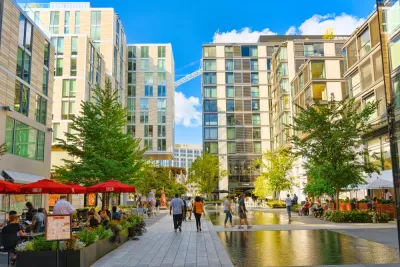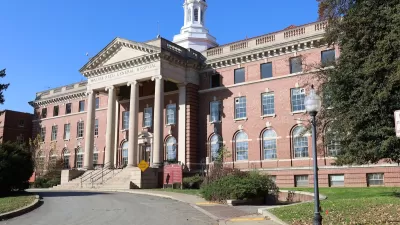Many urban cores around the country are faced with increasing office vacancies concurrently with a housing affordability crisis caused, at least in part, by a lack of supply. D.C. is particularly primed for a wave of adaptive reuse.

Josh Niland writes for Archinect: “Through the doldrums of America’s pandemic-triggered office downturn, the nation’s capital is quickly turning into a case study for the conversion of former commercial spaces into residential housing and mixed-use development.”
Niland’s assessment of the adaptive reuse market in the nation’s capital cites a number of sources, including a July article in the Washingtonian by Marisa M. Kashino that surveys various adaptive reuse projects (which Niland refers to as office conversions).
D.C.'s Deputy Mayor for Planning and Development, John Falcicchio, told Kashino that adaptive reuse can be useful for creating a 24-7 feel—especially in Downtown D.C. “We need to do [adaptive reuse] to save downtown,” says Falcicchio. “The only way to do that is to have a better mix of uses.”
Also cited is a 2019 report by the Metropolitan Washington Council of Governments indicating that the D.C. area needs to add 325,000 units before the end of the decade to keep pace with demand. The Lincoln Property Company estimated in spring 2022 that Washington, D.C. has an estimated 157.9 million square feet of rentable office space—a prime target for prospective developers.
Finally, Niland also references an article by Marissa J. Lang for the Washington Post from December 2021 when D.C. Mayor Muriel Bowser announced a new plan to spur adaptive reuse of vacant office buildings by “gathering input from current and prospective property owners on what they would need to consider transforming office structures into residences.”
Previous Planetizen coverage of adaptive reuse in the post-pandemic era (a Planetizen trend to watch in 2021):
FULL STORY: D.C. steps up office-to-residential conversions in the face of housing shortage

Study: Maui’s Plan to Convert Vacation Rentals to Long-Term Housing Could Cause Nearly $1 Billion Economic Loss
The plan would reduce visitor accommodation by 25,% resulting in 1,900 jobs lost.

North Texas Transit Leaders Tout Benefits of TOD for Growing Region
At a summit focused on transit-oriented development, policymakers discussed how North Texas’ expanded light rail system can serve as a tool for economic growth.

Using Old Oil and Gas Wells for Green Energy Storage
Penn State researchers have found that repurposing abandoned oil and gas wells for geothermal-assisted compressed-air energy storage can boost efficiency, reduce environmental risks, and support clean energy and job transitions.

From Blight to Benefit: Early Results From California’s Equitable Cleanup Program
The Equitable Community Revitalization Grant (ECRG) program is reshaping brownfield redevelopment by prioritizing projects in low-income and environmental justice communities, emphasizing equity, transparency, and community benefits.

Planting Relief: Tackling Las Vegas Heat One Tree at a Time
Nevada Plants, a Las Vegas-based nonprofit, is combating the city’s extreme urban heat by giving away trees to residents in underserved neighborhoods, promoting shade, sustainability, and community health.

How Madison’s Tree Planting Efforts Are Growing a Healthier Community
Madison’s annual tree planting initiative is enhancing environmental resilience, public health, and community livability by adding 1,400 carefully selected trees citywide, with strong community and institutional support for urban forestry.
Urban Design for Planners 1: Software Tools
This six-course series explores essential urban design concepts using open source software and equips planners with the tools they need to participate fully in the urban design process.
Planning for Universal Design
Learn the tools for implementing Universal Design in planning regulations.
Ascent Environmental
Borough of Carlisle
Institute for Housing and Urban Development Studies (IHS)
City of Grandview
Harvard GSD Executive Education
Toledo-Lucas County Plan Commissions
Salt Lake City
NYU Wagner Graduate School of Public Service





























